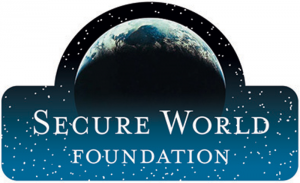
As part of the partnership between SpaceWatch Middle East and Secure World Foundation we will occasionally be publishing selected articles from the organisation. Secure World Foundation envisions the secure, sustainable and peaceful uses of outer space contributing to global stability and benefits on Earth. The mission of the Secure World Foundation is to work with governments, industry, international organisations, and civil society to develop and promote ideas and actions to achieve the secure, sustainable, and peaceful uses of outer space benefiting Earth and all its peoples. Reproduced here are Dr. Brian Weeden’s views on “Insight – Tabletop Exercises to Help Reduce the Risk of Conflict in Space” from April 1, 2017.
The space world is currently undergoing a rapid set of changes. Much has been written about the burgeoning commercial space sector, and the many new companies pursuing innovative space capabilities and activities. Quite a bit more has also been written about the growing number of countries pursuing civil space programmes for science and human spaceflight. But the growth in space activities is not limited to just the private sector or civil space; more countries are also using space for national security, defined as both military and intelligence activities, than ever before.
There are several reasons why more countries are pursuing national security space capabilities. The spread of transnational terrorism, proliferation of ballistic missiles and weapons of mass destruction, competition over natural resources, and increased concerns over border security are all major issues that can benefit from capabilities that observe regional or global changes and provide persistent monitoring – including satellite data. At the same time, military conflicts and engagements over the last two decades have shown how space capabilities can enhance the ability to project military power, particularly beyond a country’s border.
Two regions in particular demonstrate this trend. In the Middle East, continued hot, cold, and proxy wars driven by sectarian conflict and terrorism have led to significant investment in national security space capabilities by several countries. In East Asia, the threat from North Korea’s missile and nuclear programs, growing concerns over a rising China, and increasing competition over disputed islands and natural resources have caused similar shifts. Countries that have historically shunned military space activities are now developing their own military programmes, while many others are exploring commercial data purchases and national dual-use capabilities.
This increased use of space for national security creates several challenges for space sustainability. As more countries integrate space into their national military capabilities and rely on space-based information for national security, there is an increased risk that any interference with satellites could spark or escalate a crisis or conflict. At the same time, the growing reliance on space for military capabilities creates incentives for attacks on space capabilities as part of a conflict on Earth. The situation is further complicated by (1) the increasing dependence on commercial and civil space systems supporting the global economy, and (2) the challenge of determining the exact cause of a satellite malfunction: whether it was due to a space weather event, impact by space debris, unintentional interference, or deliberate aggression.
Within the national security community, a standard way to understand these issues is through the use of table-top exercises (TTXs). TTXs are much less resource intensive and complex than real-world exercises and can be used to tackle future or fictional scenarios. Done properly, a TTX uses scenarios to highlight specific issues and challenges, raise awareness among decision-makers, and identify aspects of doctrine, policy, or procedures that need to be updated. An example of how this is done in the military space context is the Schriever Wargame series, which has been held by U.S. Air Force Space Command since the early 2000s. The Schriever Wargames help the U.S. military understand what capabilities and architectures it needs for future conflicts, and in recent years, how to conduct combined space operations with allies and commercial partners.
In 2015, SWF identified a need to create a TTX series that differs from the Schriever Wargames in three important ways. First, our TTX series focuses on the pre-conflict crisis situation, and specifically on what actions increase or decrease the likelihood of the situation escalating to armed conflict. Second, our TTX series involves a wider range of international and non-military perspectives than have historically been involved in military TTXs. And third, our TTX series is completely unclassified, so that the scenarios and lessons can be widely shared within the global community.
In November 2016, we held our first TTX in partnership with the Center for Strategic and International Studies (CSIS). The goals of the first TTX were to raise awareness among national policymakers of the impact that specific national policies, strategies, doctrine, and capabilities have on crises involving space capabilities and to identify gaps in existing policy, legal, communication, multilateral mechanisms, as well as capabilities for stabilising crises and deterring conflict involving space capabilities.
The November 2016 TTX included three fictional scenarios, modeled on real-world situations. The first scenario involved a competition over natural resources in a disputed island chain, the second scenario a state-sponsored terror attack that increased border tensions, and the third scenario a proxy war and insurgency. Each scenario had four teams of players representing fictional countries. Players were drawn from government, industry, and academia, and had backgrounds in national security space, space policy, civil space, and diplomacy. A summary report with the background briefings, scenarios, and results can be found here.
With the caveat that every TTX can have different results, there were several immediate takeaways from this one that are important for reducing the likelihood of future conflicts. First, the linkages between the space domain and terrestrial conflict are not well defined or understood, even for space experts, let alone the non-space experts that would likely be in decision-making roles in a real world crisis. Second, the scenarios identified significant gaps in existing space policy, law, and operational capabilities that might have helped de-escalate the situation, but do not exist in the real-world. Third, while the results showed an overall reluctance by the teams to attack space capabilities in orbit, there was a willingness to use cyber and armed force against ground systems controlling space capabilities, which could often achieve the desired military effect; however, participants often found these attacks (often described as temporary or reversible) to be considerably more threatening and permanent than is often portrayed by theorists. The main findings from the TTX were discussed in more detail in a panel discussion at an event organized by CSIS and the Prague Security Studies Institute on March 22, 2017, in Washington, DC.
Over the course of 2017, SWF will continue to analyse and consider the outcomes of the first TTX, future iterations of the TTX, and possible follow-on projects. Our eventual goal is to use the lessons from the TTXs and related projects to develop recommendations for how to improve national and international mechanisms for preventing conflict in space.

Dr. Brian Weeden is the Director of Program Planning for Secure World Foundation and has 17 years of professional experience in space operations and policy. Dr. Weeden directs strategic planning for future-year projects to meet the Foundation’s goals and objectives, and conducts research on space debris, global space situational awareness, space traffic management, protection of space assets, and space governance. Dr. Weeden also organizes national and international workshops to increase awareness of and facilitate dialogue on space security, stability, and sustainability topics. He is a member and former Chair of the World Economic Forum’s Global Agenda Council on Space, and is also a member of the Advisory Committee on Commercial Remote Sensing (ACCRES) to the National Oceanic and Atmospheric Administration (NOAA). Prior to joining SWF, Dr. Weeden served nine years on active duty as an officer in the United States Air Force working in space and intercontinental ballistic missile (ICBM) operations. As part of U.S. Strategic Command’s Joint Space Operations Center (JSpOC), Dr. Weeden directed the orbital analyst training program and developed tactics, techniques and procedures for improving space situational awareness. Respected and recognized as an international expert, Dr. Weeden’s research and analysis have been featured in The New York Times, The Washington Post, National Public Radio, USA Today, The BBC, Fox News, China Radio International, The Economist, The World Economic Forum’s Annual Meeting in Davos, academic journals, presentations to the United Nations, and testimony before the U.S. Congress
Republished with permission from: https://swfound.org/news/all-news/2017/04/insight-tabletop-exercises-to-help-reduce-the-risk-of-conflict-in-space
Republished at: https://spacewatch.global/2017/04/insight-tabletop-exercises-to-help-reduce-the-risk-of-conflict-in-space/
 SpaceWatch.Global An independent perspective on space
SpaceWatch.Global An independent perspective on space

